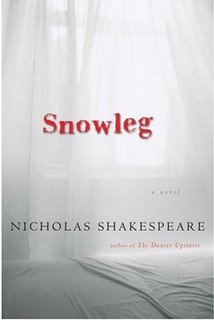
I was bored by
Little Women as a child and have never even watched the Katharine Hepburn film all the way through so I was not immediately attracted to a novel whose starting point is Louisa May Alcott’s famous book. Brooks' novel recounts the Civil War adventures of Mr. March, who is absent from home during
Little Women.
Initially I didn’t like Mr. March much. He was passionate, sensitive and idealistic (pretty positive characteristics in my mind) but also condescending. I thought he was condescending when he talked his efforts to make Marmee, his wife, curb her temper and, in spite of the fact that the family had been an active station on the underground railroad for years, he was condescending to blacks too.
I ended up liking the book better in the second half than the first. The Marmee section was superb and caused me to wonder at first whether this female writer was not much better at creating female characters. For me Marmee burst on the scene with complete credibility. But my problem with March was not really that I didn't find him credible. I did find him shadowy compared with Marmee. That’s not really for lack of adequate characterization, but because he’s a complex man whose idealism puts him in some ways completely out of touch with both himself and the outside world.
My initial complaints that March was condescending to both women and blacks turned out to be quite justified. We first meet Marmee in the novel when she’s called to the hospital bedside of her husband, who was brought in on a boat full of injured soldiers. When Marmee exploded in anger at an officious nurse in the hospital, I felt like standing up and cheering. If that scene is any indication Marmee had learned not to curb her temper (as her husband advised) but to use it effectively.
The other female character who stands out is Grace Clement. She’s the black offspring of a Virginia plantation owner whom March meets on his travels as a Yankee peddler in the South in his youth. He’s attracted to her, and she helps him arrange an informal school for young slaves. Clement finds out and asks March to leave, but not before making sure that he witnesses Grace laid out for all the blacks to see and whipped so that strips of flesh fly off her back.
Grace appears twice more in the novel—when March is moved from chaplain duties to schoolteacher and sent to a plantation where he finds a Yankee in charge and Grace tending to the wreck of an aged parent—the one who had her whipped—and then again when she turns up as a nurse in the Washington hospital where March is taken. Coincidence? Certainly, but Brooks uses it very effectively.
I also liked Grace and applauded her final scene with March where she announces she’s going to join a regiment of freed slaves as nurse and March, frantic to make up for horrors that he takes blame for but could not have stopped, says he’ll go with her. The scene reminded me of Humphrey Bogart's speech to Ingrid Bergman as he pushes her onto the Lisbon plane with her husband: "Where I go you can't go and what I do you can't be any part of..." or something close. But there was a reprimand in Grace's speech to March too—that he was arrogant if he thought he personally was responsible for so much death and destruction and also if he thought he could "make up for" the horrors of war. She told him in no uncertain terms that she was going to help her people and his presence would add nothing. Like Bogart's speech in Casablanca, it was partly manipulating him for his own good, but it was also a statement of independence and personal commitment on Grace's part. She had clearly decided—now that she was in a position to decide freely—who her people were and how her talents could best be used.
Two strong women and one relatively weak man--that's what this novel is about.
The ending to the novel was abrupt, but not inappropriate. I don't believe that the author was bored with her story as some have suggested. March was a “broken man” and change for him would require a fundamental reorientation in his most basic beliefs and to have had that happen suddenly might have been dramatic but would have been pretty unbelievable. We leave him in a sort of daze, home with his family, delighted with his daughters, reconnecting with at least some of his core values. There's certainly hope for the rest of his life, but not certainty by any means.
But for the novelist to have followed him any further would have been anticlimactic. 
 This book is probably better than my review will suggest. It seemed anticlimactic, though, after The Weather Makers which is a newer book. I’ve had this one around for a couple of years and, fired up by ways to support conservation efforts which I’m now convinced are absolutely necessary to preserve life on this planet, I picked it up to read.
This book is probably better than my review will suggest. It seemed anticlimactic, though, after The Weather Makers which is a newer book. I’ve had this one around for a couple of years and, fired up by ways to support conservation efforts which I’m now convinced are absolutely necessary to preserve life on this planet, I picked it up to read.





